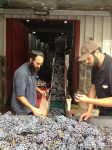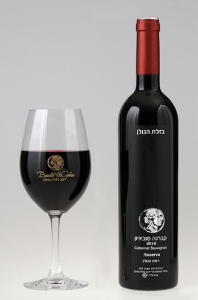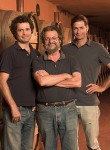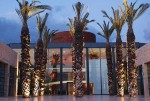Tabor Winery uses only 10 growers, which is unique and helps control the quality of the grapes. (photo from taborwines.com)
The fifth in a series featuring nine Israeli wine producers features Justin Kohn of Tabor Winery. The most recent article – on Bazelet HaGolan Winery – was published in the Jewish Independent on Sept. 19, and can be found online at jewishindependent.ca.
Christopher Barnes: How did the winery get off the ground?
Justin Kohn: We’re fourth-generation growers, in the village by Tabor, right by the Mount Tabor. The Sela family [was] growing for about 100 years, and Oren Sela, company CEO, told his father, “Let’s make our own wine. A lot of people are doing it now in Israel, and they’ve been very successful.” They started up with 30,000 bottles, really to friends and a few critics, and word got out. Now, 2.3 million bottles later, we’re the sixth-largest producer in Israel.
CB: Talk a little bit about the types of soils and the climate that you have.
We also have some vineyards in the northern part of the Golan, even some in the northern Galilee and even some in the Golan Heights, so we really have the best selection of grapes coming out of the Galilee region. But, unlike other large wineries, we only use 10 growers, which is unique – this helps us to really control the quality. Each grower is incentivized by an agronomist, who will evaluate the quality of the crop and, therefore, pay them more based on the quality. She’ll visit each grower once a week and she has the ultimate say, not just when to prune, when to harvest, etcetera, but even which grapes to grow. There have been times she’s ripped out vines and replanted new vines where she’s deemed them suitable in that soil type.
CB: What would you say is unique about Tabor?
JK: I think the most unique aspect of Tabor Winery is that we really allow nature to take over and we try to step back. We let the soil do the talking, let the grapes do the talking. We don’t try to mask it. The winemaking process is pretty simple but we take ultimate care in the growing. We really focus on the soil to make sure that we have the ideal varietal growing in a soil, and how to manage that particular varietal throughout the year.
Additionally, we started as a boutique winery; we’re now producing 2 to 2.3 million bottles – we’re a large winery – but, as I mentioned, as a boutique, our focus and our DNA has always been on quality. We’re able now to continue producing quality but we don’t have the pressure of producing volume. I mentioned we’re the sixth largest – those ahead of us are about five times our size. Some of them, number five is even two times our size.
So, the attention to quality is there and yet the economies of scale to drive the price down per bottle really gives us an advantage over some other wineries.
CB: Anything else you want to add?
JK: I think Tabor is in a very unique position in the market, in that we’re making wines that are approachable and drinkable for what the consumer wants and at price points that are also approachable, everyday price points…. We think wine is meant to be enjoyed by people with other people. Being able to come home to that bottle every day is really what it’s about.
This article is reprinted courtesy of the Grape Collective, an online publication for all things wine. For more information, visit grapecollective.com.





